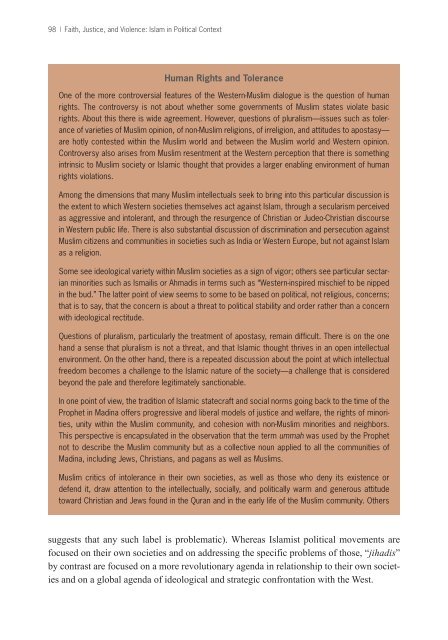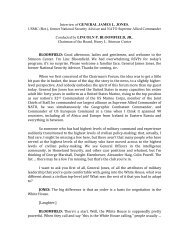Islam and Politics - The Stimson Center
Islam and Politics - The Stimson Center
Islam and Politics - The Stimson Center
Create successful ePaper yourself
Turn your PDF publications into a flip-book with our unique Google optimized e-Paper software.
98 | Faith, Justice, <strong>and</strong> Violence: <strong>Islam</strong> in Political Context<br />
Human Rights <strong>and</strong> Tolerance<br />
One of the more controversial features of the Western-Muslim dialogue is the question of human<br />
rights. <strong>The</strong> controversy is not about whether some governments of Muslim states violate basic<br />
rights. About this there is wide agreement. However, questions of pluralism—issues such as tolerance<br />
of varieties of Muslim opinion, of non-Muslim religions, of irreligion, <strong>and</strong> attitudes to apostasy—<br />
are hotly contested within the Muslim world <strong>and</strong> between the Muslim world <strong>and</strong> Western opinion.<br />
Controversy also arises from Muslim resentment at the Western perception that there is something<br />
intrinsic to Muslim society or <strong>Islam</strong>ic thought that provides a larger enabling environment of human<br />
rights violations.<br />
Among the dimensions that many Muslim intellectuals seek to bring into this particular discussion is<br />
the extent to which Western societies themselves act against <strong>Islam</strong>, through a secularism perceived<br />
as aggressive <strong>and</strong> intolerant, <strong>and</strong> through the resurgence of Christian or Judeo-Christian discourse<br />
in Western public life. <strong>The</strong>re is also substantial discussion of discrimination <strong>and</strong> persecution against<br />
Muslim citizens <strong>and</strong> communities in societies such as India or Western Europe, but not against <strong>Islam</strong><br />
as a religion.<br />
Some see ideological variety within Muslim societies as a sign of vigor; others see particular sectarian<br />
minorities such as Ismailis or Ahmadis in terms such as “Western-inspired mischief to be nipped<br />
in the bud.” <strong>The</strong> latter point of view seems to some to be based on political, not religious, concerns;<br />
that is to say, that the concern is about a threat to political stability <strong>and</strong> order rather than a concern<br />
with ideological rectitude.<br />
Questions of pluralism, particularly the treatment of apostasy, remain difficult. <strong>The</strong>re is on the one<br />
h<strong>and</strong> a sense that pluralism is not a threat, <strong>and</strong> that <strong>Islam</strong>ic thought thrives in an open intellectual<br />
environment. On the other h<strong>and</strong>, there is a repeated discussion about the point at which intellectual<br />
freedom becomes a challenge to the <strong>Islam</strong>ic nature of the society—a challenge that is considered<br />
beyond the pale <strong>and</strong> therefore legitimately sanctionable.<br />
In one point of view, the tradition of <strong>Islam</strong>ic statecraft <strong>and</strong> social norms going back to the time of the<br />
Prophet in Madina offers progressive <strong>and</strong> liberal models of justice <strong>and</strong> welfare, the rights of minorities,<br />
unity within the Muslim community, <strong>and</strong> cohesion with non-Muslim minorities <strong>and</strong> neighbors.<br />
This perspective is encapsulated in the observation that the term ummah was used by the Prophet<br />
not to describe the Muslim community but as a collective noun applied to all the communities of<br />
Madina, including Jews, Christians, <strong>and</strong> pagans as well as Muslims.<br />
Muslim critics of intolerance in their own societies, as well as those who deny its existence or<br />
defend it, draw attention to the intellectually, socially, <strong>and</strong> politically warm <strong>and</strong> generous attitude<br />
toward Christian <strong>and</strong> Jews found in the Quran <strong>and</strong> in the early life of the Muslim community. Others<br />
suggests that any such label is problematic). Whereas <strong>Islam</strong>ist political movements are<br />
focused on their own societies <strong>and</strong> on addressing the specific problems of those, “jihadis”<br />
by contrast are focused on a more revolutionary agenda in relationship to their own societies<br />
<strong>and</strong> on a global agenda of ideological <strong>and</strong> strategic confrontation with the West.

















